he fall of Robert Mugabe, who was a fixture in global affairs for nearly four decades, was sudden, swift and bloodless.
A little more than a week after the military warned the government it might step in, a new president is already in the making.
Now, his former political party and the military are claiming it is “business as usual”.
But there is still much we don’t know.
Did the ‘coup’ happen to protect the military chief?
The military intervened following the sacking of vice-president Emmerson Mnangagwa, which was widely seen as clearing the way for Mr Mugabe’s wife to succeed him.
But there may also have been another element at play.
The first hint of trouble came a few days earlier, when military chief Gen Constantine Chiwenga issued a warning to Mr Mugabe over “the current purging” in the ruling Zanu-PF party. He felt former liberation fighters – like Mr Mnangagwa – were being targeted.
Gen Chiwenga was on a trip to China for military meetings when, according to reports in a number of news outlets, plans were made to arrest him upon his return.
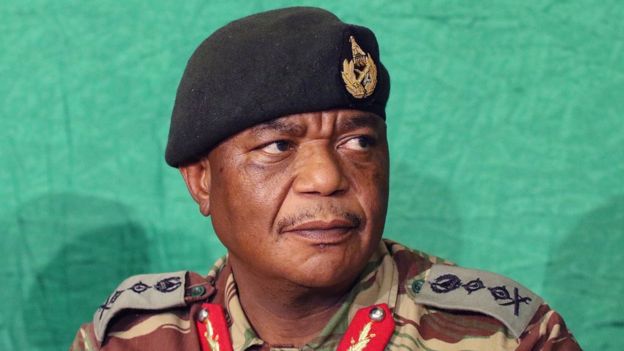 Image copyrightEPA
Image copyrightEPABut the general reportedly learned of the plot, and was met at the airport on his return by a significant number of his own troops to ensure his protection.
And then the military placed Mr Mugabe under house arrest.
The military are being widely praised for their intervention – but it may also have been protecting its own interests.
Where is Robert Mugabe?
Mr Mugabe has been conspicuously absent since Sunday.
The 93-year-old former former president was placed under house arrest on 14 November.
Since then, Mr Mugabe has been kept under guard at his “blue roof” mansion, a luxury home on secluded grounds on the capital’s outskirts.
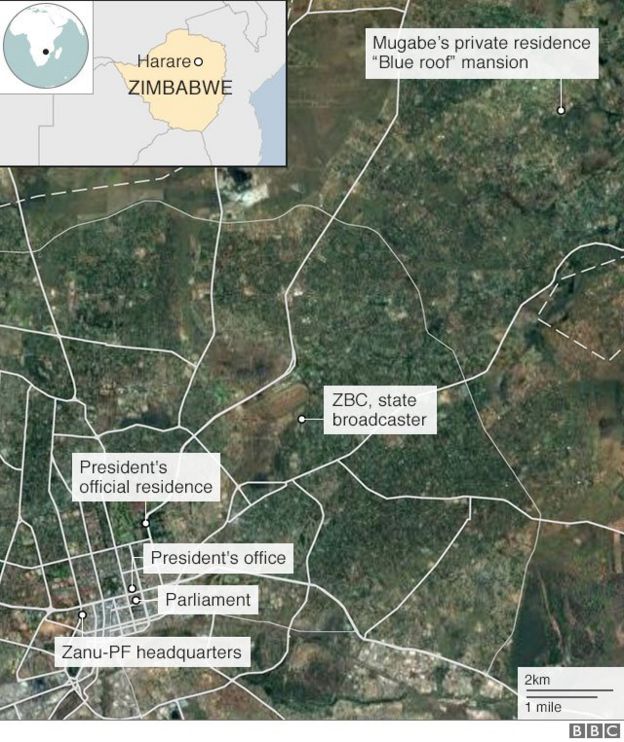
On 17 November, under military guard, he presided over a university graduation ceremony. Two days later, he appeared in a live television address to read a prepared statement.
But he has not been seen since – even his resignation was announced by post.
What happened at the ‘baffling’ televised address?
Sunday’s speech was described by one BBC correspondent as “a baffling 20 minutes”.
After days in which it was clear the military was in charge, Mr Mugabe’s major televised address was widely expected to be about his resignation.
Instead, Mr Mugabe gave a dull speech, which said very little about the mass calls for his departure – and then declared he was looking forward to managing the party conference a few weeks later.
The party had already disowned him.
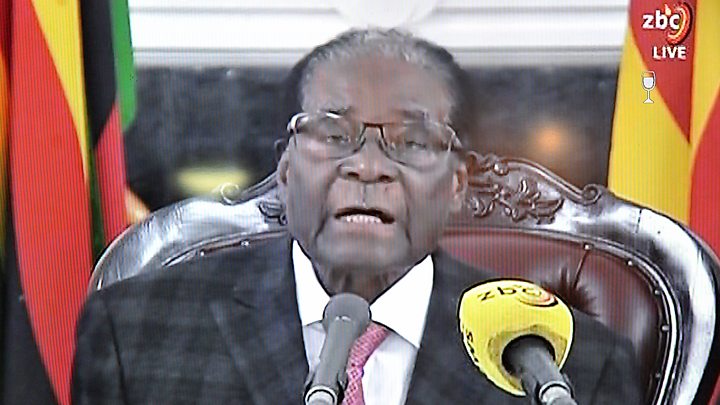
One BBC presenter observed “some very odd shuffling of papers going on and generals watching him closely” during the unusual address.
Once it was over, questions started emerging: did he read the wrong speech? Online sleuths poring over the video footage claimed that just before Mr Mugabe began, a collection of papers being passed along were dropped under a chair.
Even the head of the powerful war veterans group, Chris Mutsvangwa, said Mr Mugabe “appeared to swap the agreed speech”.
It has also been suggested that he did not want to resign live, on international television, flanked by the military.
Why did he then suddenly resign?
After apparently claiming he would continue in the role – defying all expectations – the president then vanished once again. The military said it had agreed a “roadmap” for the future with Mr Mugabe – but would not say what it was.
Then, on Tuesday, parliament met to discuss impeachment.
And in the middle of the debate, the Speaker halted proceedings, saying he had received a letter titled “notice of resignation” – and the parliament erupted in cheers.
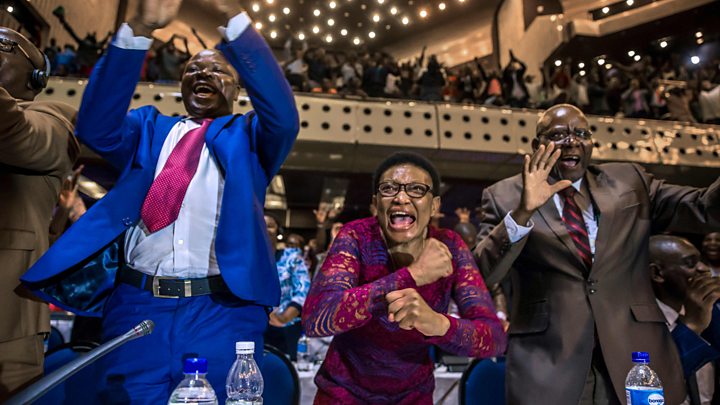
But Mr Mugabe did not make an appearance, and he has not said anything since.
It may simply be that Mr Mugabe did not want the ignominy of being formally impeached, but it is not clear if the letter was part of the “roadmap” agreed with the military.
What happens to Mr Mugabe now?
As president, Mr Mugabe enjoyed immunity from prosecution, even if there was a desire to being any kind of charges against him.
He is also of advanced age, and has spent much time abroad receiving medical treatment.
Even opposition leader Morgan Tsvangirai said Mr Mugabe should be allowed to “go and rest for his last days”.
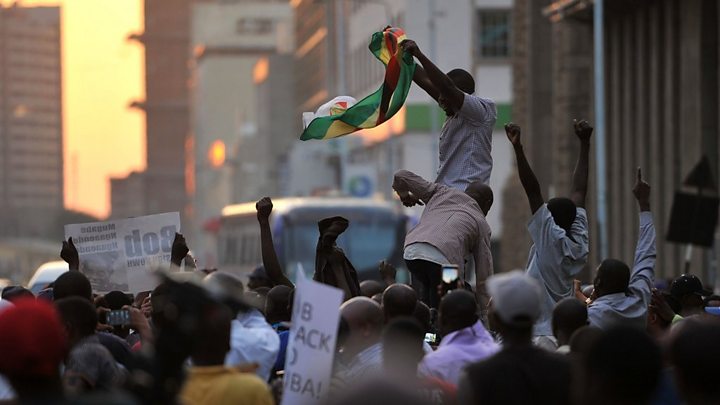
He may choose to head abroad rather than remain in a country that has turned on him.
Singapore is one of the lead contenders, as Mr Mugabe has received medical care there for more than a decade.
South Africa should also be a good option, since Mr Mugabe is friendly with President Jacob Zuma – but Mr Zuma will have to consider how his voters would view such a move.
Mr Mugabe’s wife Grace is also accused of assaulting a model in the country in August. She was granted diplomatic immunity – but it’s not clear that would last if she returned to South Africa as a regular civilian.
What about his wife, Grace?
Mrs Mugabe, once a contender for the presidency after her husband, has not been seen nor heard from since before the start of the military intervention.
It is thought that she may, like her husband, be under house arrest at the “blue roof” mansion.
But in the early, chaotic stages of the military action, some reports suggested she had successfully fled the country.
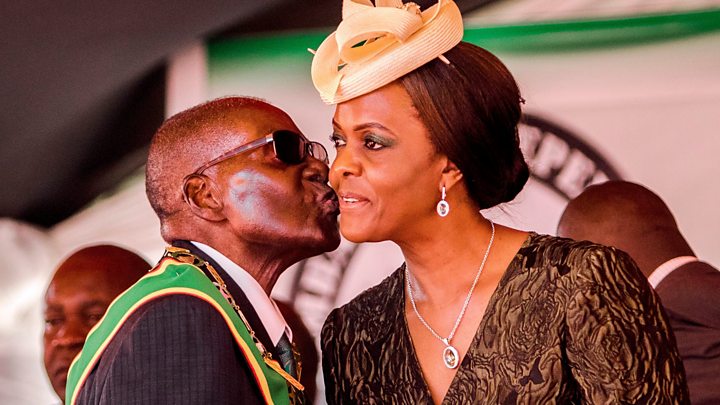
The military has not confirmed her location, and she has not appeared in photographs or on television alongside her husband.
Mr Mugabe was accused by his party of allowing his wife to “usurp constitutional power” she had no right to.
When the Zanu-PF party voted to expel Mrs Mugabe on Sunday, a party delegate claimed that she would be prosecuted along with several others – but it is not clear on what charges.
When are the elections?
Zimbabwe is due to hold elections before September 2018. Under Zimbabwe’s constitution, elections for both parliament and the presidency happen at the same time.
The exact date has not yet been declared, but party officials have suggested former Vice President Mr Mnangagwa will take office until then, serving the rest of Mr Mugabe’s term.
But that is all subject to change.
Early elections can happen if the parliament votes to dissolve, and under a handful of other specific circumstances – which may come into play depending on the political fallout from the departure of the only modern leader Zimbabwe has ever known.


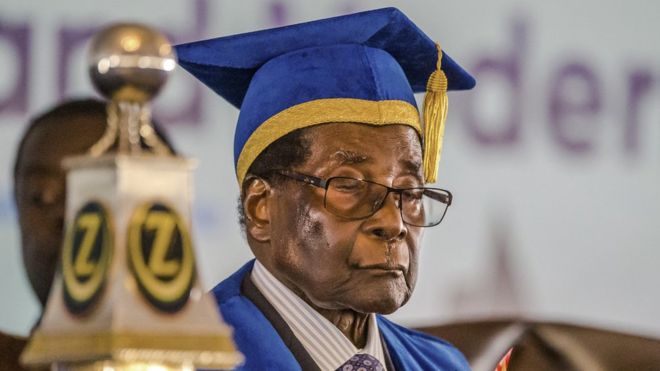
Wait! am still reading.
Mugabe should be REINSTATED now.
He WILL NOT prosecuted and deserve his presidency back NOW
I hold a PhD
Thanks
BB2014,2016
Ba mushota bena balipena
Mushota I have never seen a more brainless person than you…..
It’s fact those military men are good shuffling masters talk about dj general chiwenga, am sure mugabe prepared a speech to talk about the usual, IMPERIALISTS AND COLONIALISTS, but master shuffler change with a meaningless useless speech.
Thank God mugabe is gone.
Munangagwa thinks he is the winner. He better treat Mugabe with respect.
Mugabe is a sober man with a strange wife.
Just ignore that attention seeking skunk!
Mushota,
you clearly are out of tough with reality, PhD or no PhD.
You must be very hungry indeed, if you one day you should wake up and find that you have to swallow all the crazy things you said in the past.
Sleep well while you can!
sorry, “out of touch”, not ‘tough’
The Man resigned to protect the country from further damage and it shows that he respects the institutions of governance and the will of the people. Let him enjoy his retirement.
Zambians shouldn’t look at Mugabe in the context of their Leader who abrogates the Constitution with impunity. It’s clear to assess from the writers view point that he’s a zambian who is used to seeing his Leader not follow constitutionality. Take off your Zambian lenses. Mugabe is much more intelligent than your leader. He upheld constitutional provisions.
There’s no mystery Mr author. We saw it coming and only reason it come sooner is in your first paragraph : To protect themselves until Gabriel did the unthinkable by trying to install his Grace as VP.
Political leadership is not sexually transmitted.
General Mugabe, that’s all i can say
How authentic was the letter of resignation..? More questions thn answers. The military could have drafted the letter and sent it to parliament.
Comments are closed.